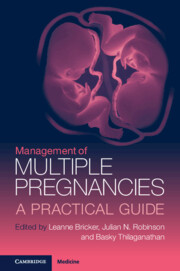Book contents
- Management of Multiple Pregnancies
- Management of Multiple Pregnancies
- Copyright page
- Contents
- Editors
- Contributors
- Chapter 1 Epidemiology of Multiple Pregnancy
- Chapter 2 Assisted Conception and Multiple Pregnancy
- Chapter 3 Zygosity, Chorionicity and Amnionicity
- Chapter 4 Multifetal Pregnancy Reduction
- Chapter 5 Gestational Dating in Multiple Pregnancy
- Chapter 6 Screening for Fetal Aneuploidy in Multiple Pregnancy
- Chapter 7 Screening for Fetal Abnormality in Multiple Pregnancy
- Chapter 8 Screening and Diagnosis of Complications of Shared Placentation
- Chapter 9 Invasive Prenatal Diagnosis in Multiple Pregnancy
- Chapter 10 Conjoined Twinning
- Chapter 11 Management of Discordant Fetal Anomaly
- Chapter 12 Single and Double Fetal Loss in Twin Pregnancy
- Chapter 13 Management of Twin–Twin Transfusion Syndrome
- Chapter 14 Management of Twin Anaemia-Polycythaemia Sequence
- Chapter 15 Management of Twin-Reversed Arterial Perfusion (TRAP) Sequence
- Chapter 16 Management of Fetal Growth Pathology in Multiple Pregnancy
- Chapter 17 Management of Monoamniotic Twins
- Chapter 18 Maternal Complications in Multiple Pregnancy
- Chapter 19 Risk Assessment and Screening for Preterm Birth in Multiple Pregnancy
- Chapter 20 Prevention of Preterm Birth in Multiple Pregnancies
- Chapter 21 Optimal Antenatal Care in Multiple Pregnancy
- Chapter 22 Triplet and Higher-Order Pregnancy
- Chapter 23 Timing of Delivery in Multiple Pregnancy
- Chapter 24 Mode of Delivery in Multiple Pregnancy
- Chapter 25 Practical Management of Vaginal Delivery in Multiple Pregnancy
- Chapter 26 Neonatal Care Aspects of Multiple Pregnancy
- Chapter 27 Lifestyle Considerations for Multiple Pregnancy
- Chapter 28 Emotional and Mental Well-Being in Multiple Pregnancy
- Chapter 29 New Frontiers in Multiple Pregnancy Management
- Chapter 30 Multiple Pregnancy Resources for Professionals and the Public
- Chapter 31 Obstetric Anaesthesia in Multiple Pregnancy
- Index
- Plate Section (PDF Only)
- References
Chapter 3 - Zygosity, Chorionicity and Amnionicity
Published online by Cambridge University Press: 11 October 2022
- Management of Multiple Pregnancies
- Management of Multiple Pregnancies
- Copyright page
- Contents
- Editors
- Contributors
- Chapter 1 Epidemiology of Multiple Pregnancy
- Chapter 2 Assisted Conception and Multiple Pregnancy
- Chapter 3 Zygosity, Chorionicity and Amnionicity
- Chapter 4 Multifetal Pregnancy Reduction
- Chapter 5 Gestational Dating in Multiple Pregnancy
- Chapter 6 Screening for Fetal Aneuploidy in Multiple Pregnancy
- Chapter 7 Screening for Fetal Abnormality in Multiple Pregnancy
- Chapter 8 Screening and Diagnosis of Complications of Shared Placentation
- Chapter 9 Invasive Prenatal Diagnosis in Multiple Pregnancy
- Chapter 10 Conjoined Twinning
- Chapter 11 Management of Discordant Fetal Anomaly
- Chapter 12 Single and Double Fetal Loss in Twin Pregnancy
- Chapter 13 Management of Twin–Twin Transfusion Syndrome
- Chapter 14 Management of Twin Anaemia-Polycythaemia Sequence
- Chapter 15 Management of Twin-Reversed Arterial Perfusion (TRAP) Sequence
- Chapter 16 Management of Fetal Growth Pathology in Multiple Pregnancy
- Chapter 17 Management of Monoamniotic Twins
- Chapter 18 Maternal Complications in Multiple Pregnancy
- Chapter 19 Risk Assessment and Screening for Preterm Birth in Multiple Pregnancy
- Chapter 20 Prevention of Preterm Birth in Multiple Pregnancies
- Chapter 21 Optimal Antenatal Care in Multiple Pregnancy
- Chapter 22 Triplet and Higher-Order Pregnancy
- Chapter 23 Timing of Delivery in Multiple Pregnancy
- Chapter 24 Mode of Delivery in Multiple Pregnancy
- Chapter 25 Practical Management of Vaginal Delivery in Multiple Pregnancy
- Chapter 26 Neonatal Care Aspects of Multiple Pregnancy
- Chapter 27 Lifestyle Considerations for Multiple Pregnancy
- Chapter 28 Emotional and Mental Well-Being in Multiple Pregnancy
- Chapter 29 New Frontiers in Multiple Pregnancy Management
- Chapter 30 Multiple Pregnancy Resources for Professionals and the Public
- Chapter 31 Obstetric Anaesthesia in Multiple Pregnancy
- Index
- Plate Section (PDF Only)
- References
Summary
Chorioamnionicity is a crucial factor in the risk assessment of a multiple pregnancy. Although knowledge of zygosity is of limited clinical importance, the early identification of the number of fetuses and determination of their chorionicity and amnionicity is critical to proper obstetric management. Prenatal ultrasound permits early and accurate diagnosis of chorioamnionicity. The sonographic features of monochorionicity versus dichochorionicity in the early first trimester, late first trimester, and second and third trimesters share many similarities but significant variation occurs with advancing gestation. While some sonographic findings have very high predictive values and can be confidently used to establish chorioamnionicity, others are less reliable. Therefore, evaluation of as many features as possible should be performed during obstetric ultrasound.
- Type
- Chapter
- Information
- Management of Multiple PregnanciesA Practical Guide, pp. 18 - 38Publisher: Cambridge University PressPrint publication year: 2022

